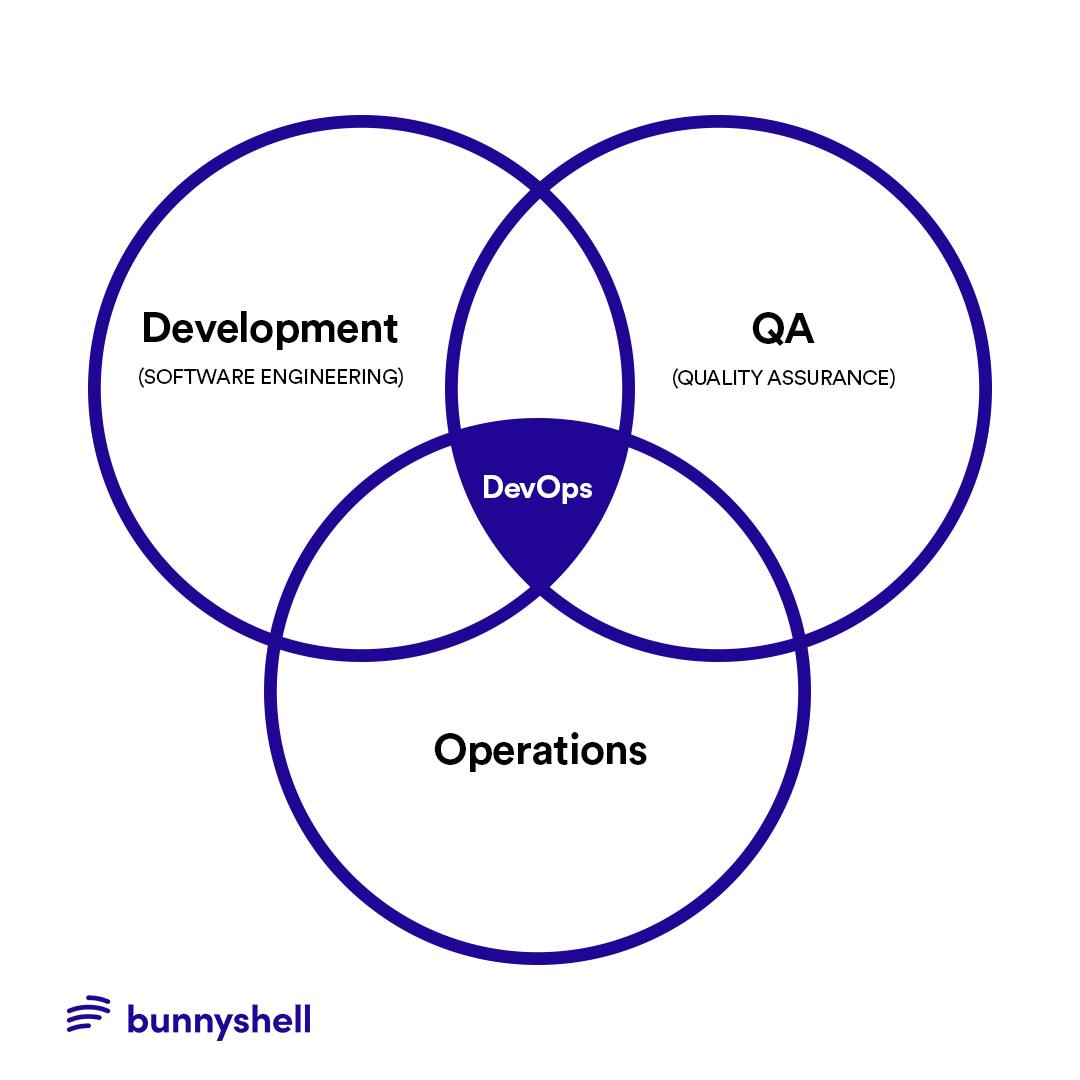Both SysOps (system operations) and DevOps (development operations) are two central components of Cloud Computing, one of the leading technologies of the last decade. As some organizations find it difficult to distinguish between the two, we have decided to cover their similarities and differences in detail.
Essentially, both terminologies are extremely popular with companies, as they both work to provide functionalities to help increase the productivity of the business.
Background
In this article, we will talk about what SysOps and DevOps are, the main differences and similarities, frequently asked SysOps questions, as well as the solution Bunnyshell offers.
The discussion around these two philosophies is a very important one because, ultimately, the nature of the tasks they undergo are very similar to each other. The main differences that occur, as we will show you later on, happen in the delivery, update reactions, entity change, approach towards service, and code development.
We will also cover more specific concepts relating to SysOps, its delivery model, and some areas we see it being used.
Summary
In this article, we will cover the following points:
- Short intro to DevOps
- Short intro into SysOps
- Main differences between SysOps and DevOps
- Main similarities between SysOps and DevOps
- Frequently asked questions about SysOps
- The Bunnyshell solution
Short Intro to DevOps

The DevOps approach aims to maximize operational processes. The main purpose of DevOps is speed, and it uses a delivery model where teams develop, write, test, and release application software in short time cycles. To make time cycles shorter and the releases more stable, DevOps relies heavily on automation. Automation platforms, in turn, enable engineers to accomplish tasks that would have otherwise required help from other teams independently.
If you want to read more about the meaning of DevOps and the role of automation, check out our dedicated blog post.
Short Intro to SysOps
The SysOps approach is focused on making the system processes work smoothly in an organization. For SysOps, the configurations are taken care of at individual levels, being centralized around infrastructure, compared to DevOps, which, although it has the same way of managing infrastructure, relies on the latest automation tools to get it taken care of.
SysOps delivery model is based on ITIL (Information Technology Infrastructure Library), which is a set of thorough guidelines that focus on aligning business goals with IT services. Through this ITIL delivery model, the firm or organization can form a baseline from which it can design, execute, and measure. It will show compliance and estimate improvement.
SysOps Use Cases
We will highlight some ITIL-based models which have been adopted by an organization:
- MOF (Microsoft Operations Framework) – a series of 23 documents that help IT professionals to create, implement, and manage cost-effective and efficient services
- Hewlett Packard (HP reference model) – a tool useful in presenting several different management processes, inter-process relationships, and business linkages for IT to successfully implement services in the e-world.
- IBM (IT business model) – industry template used to define common business processes and services across the enterprise
Main Differences | SysOps vs DevOps
Choosing between these two methodologies is a matter of personal preference and requirements. Below, you will find a table outlining some key differences between SysOps and DevOps.
| SysOps | DevOps | |
|---|---|---|
| Delivery model | Based on information technology infrastructure library (ITIL) | Based on the coordination between the development and operations team |
| Where changes are applied | Changes applied to the server | Changes applied to the code |
| Code development | Team tends to favour a consistent code change rate and code deployments when helping out a team | Team tends to favour the unpredictable code change rate and code deployments |
| Reaction to change | Not so flexible to change; provides a risk-free continuation of services | Open to change as development and operations teams come together and arrive at an effective consensus to address the change |
| How the system is | The system is rather rigid and tends to follow a risk-free continuation | The system is more flexible and open to experimentation, often rewarding in terms of innovation |
| System features | Configurations are centralized around infrastructure, which is taken care of at individual levels | Manages infrastructure by using the latest automation tools to take care of it |
| Goal | More about streamlining system processes that are already in place | More about improving customer experience and business value with new services |
To sum up, SysOps manages, operates, and monitors the systems and infrastructure, while DevOps develops, manages, operates, and monitors the software.
Main Similarities | SysOps vs DevOps
We have briefly mentioned some ways in which SysOps and DevOps are similar, but let us go over similarities again:
- Businesses can use either platform in order to gain profit and success
- Both are widely used areas of Cloud computing
- Those are two approaches that were started as a result of immense advancement in the field of technology in the internet and cloud era
- Both provide functionality that helps the developer team increase the productivity of the business
- Engineers of both approaches help in the management of all of the key responsibilities and tasks of the IT sector of a company.
These two terms are used the most widely in Cloud Computing, therefore, some may say that they are interchangeable, even with all of their known differences.
Frequently Asked Questions about SysOps
Some questions about SysOps that we encounter:
- Which of the two approaches is more contemporary? It can be said that DevOps is the more contemporary of the two systems.
- Which of the two is harder? When it comes to taking an exam for a job posting, for example, they are both equally difficult in their own right.
- What is one of the more popular SysOps certifications you can get? AWS (Amazon Web Services) Certification.
- Does SysOps cover developer content also? Short answer: yes.
The BunnyShell Solution
We are no strangers to the fact that IT is an essential factor that is required by a business to thrive in any market. SysOps and DevOps are therefore changing and continuously improving the development process of any software or application. Even though we covered the main ways they are different, it can be said that if SysOps and DevOps professionals work in tandem, they will be able to best fit the needs of their clientele. You can go for either of them for guaranteed success in the market.
Whether you are an e-commerce company, SaaS, or development agency, we at Bunnyshell have the solution for you. You can use our DevOps automation platform to continue optimizing your application for performance and reliability. Not only that, but as software keeps evolving and becoming more complex, we passionately keep creating tools that empower our customers and partners to grow and deliver better software faster.
Start your free trial with Bunnyshell today
